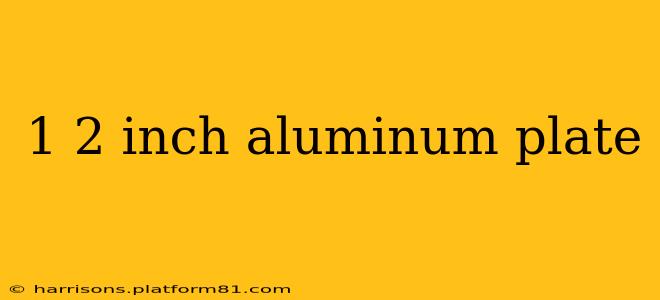Finding the right aluminum plate for your project can feel overwhelming. With various alloys, thicknesses, and finishes available, understanding your needs is crucial. This guide delves into the specifics of 1/2 inch aluminum plates, covering everything from their applications to choosing the right one for your specific task.
What are the Common Uses of 1/2 Inch Aluminum Plates?
1/2 inch aluminum plates offer a versatile combination of strength and lightweight properties, making them suitable for a wide range of applications. Their common uses include:
- Machining: Their machinability makes them ideal for creating intricate parts and components in various industries.
- Fabrication: They are easily welded, cut, and formed, enabling the creation of complex structures.
- Protective Shielding: Their durability provides excellent protection against impacts and abrasion.
- Heavy-duty applications: The thickness provides significant structural integrity for demanding projects.
- Transportation: Used in the construction of vehicles and aircraft components.
- Industrial Equipment: Often incorporated into machinery and industrial tools.
What are the Different Alloys of 1/2 Inch Aluminum Plates?
Aluminum alloys significantly impact the plate's properties. The most common alloys used in 1/2 inch plates include:
- 6061: Known for its excellent strength, weldability, and corrosion resistance. A popular choice for structural applications.
- 5052: Offers high strength and exceptional corrosion resistance, particularly in marine environments.
- 5083: Provides superior strength and corrosion resistance, commonly used in marine and aerospace applications.
- 7075: Known for its incredibly high strength-to-weight ratio, ideal for high-stress applications. However, it's less weldable than other alloys.
The choice of alloy depends on the specific requirements of your project. Consider factors such as strength, corrosion resistance, and weldability when making your selection.
What is the Weight of a 1/2 Inch Aluminum Plate?
The weight of a 1/2 inch aluminum plate varies depending on the alloy and dimensions. Aluminum's density is approximately 2.7 g/cm³. To calculate the weight, you'll need the plate's length, width, and the specific gravity of the alloy being used. Many online calculators are available to assist with these calculations.
Where Can I Buy 1/2 Inch Aluminum Plates?
1/2 inch aluminum plates are readily available from various suppliers, including online retailers, metal distributors, and local metal suppliers. It's advisable to compare prices and specifications from multiple vendors to ensure you find the best option for your needs and budget.
What is the Difference Between 1/2 Inch Aluminum Plate and Sheet?
While the terms are sometimes used interchangeably, there's a subtle difference:
- Plate: Generally refers to thicker pieces of aluminum, typically 1/4 inch or thicker. They are often used for structural components and applications requiring high strength and durability.
- Sheet: Refers to thinner aluminum pieces, usually less than 1/4 inch thick. They are often used for applications requiring less structural integrity, such as decorative panels or enclosures.
A 1/2 inch aluminum piece would definitively be categorized as a plate.
What are the Different Finishes Available for 1/2 Inch Aluminum Plates?
Aluminum plates can have various finishes to enhance their appearance, corrosion resistance, or other properties. Common finishes include:
- Mill finish: The natural finish left after the manufacturing process.
- Anodized: A protective coating that enhances corrosion resistance and provides a decorative finish.
- Powder coated: A durable finish offering excellent protection against corrosion and abrasion.
- Painted: Provides a decorative finish and can enhance corrosion resistance.
Choosing the right finish depends on the intended application and desired aesthetic.
This comprehensive guide provides a solid foundation for understanding 1/2 inch aluminum plates. Remember to carefully consider the alloy, finish, and overall specifications before making your purchase to ensure it meets your project's requirements. Remember to consult with a metal specialist for advice on specific applications.
